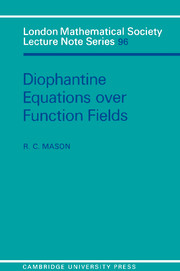Book contents
- Frontmatter
- Contents
- PREFACE
- Chapter I The Fundamental Inequality
- Chapter II The Thue Equation
- Chapter III The Hyperelliptic Equation
- Chapter IV Equations of Small Genus
- Chapter V Bounds for Equations of Small Genus
- Chapter VI Fields of Arbitrary Characteristic
- Chapter VII Solutions for Non-Zero Characteristic
- Chapter VIII The Superelliptic Equation
- References
- Frontmatter
- Contents
- PREFACE
- Chapter I The Fundamental Inequality
- Chapter II The Thue Equation
- Chapter III The Hyperelliptic Equation
- Chapter IV Equations of Small Genus
- Chapter V Bounds for Equations of Small Genus
- Chapter VI Fields of Arbitrary Characteristic
- Chapter VII Solutions for Non-Zero Characteristic
- Chapter VIII The Superelliptic Equation
- References
Summary
At the International Congress of Mathematicians held in Paris in 1900, David Hilbert proposed a list of 23 problems intended to engage the attention of researchers in mathematics. The tenth problem requested a universal algorithm for deciding whether any Diophantine equation is soluble in integers. Although as proved by Matijasevic in 1970, no such general algorithm actually exists, this century has generated a substantial body of knowledge on the more limited, but tractable, problems associated with equations in two variables only. In particular, the works of Thue, Siegel and Baker, which are discussed within in some detail, have been particularly fruitful, and mention should also be made on a most recent outstanding result, namely Faltings' establishment of the Mordell conjecture.
The aim of this book is to provide a connected and self-contained account of researches on similar problems appertaining to equations over function fields. The purpose throughout is the production of complete algorithms for the effective resolution of the families of equations under consideration. The algorithms obtained turn out to be much simpler and more efficient than those provided by the analysis for number fields. This is a reflection of the strength of the fundamental inequality which forms the crux of the approach, and which may also be regarded as a loose analogue of Baker's celebrated lower bounds for linear forms in logarithms. The particular families of equations treated are those of the Thue, hyperelliptic, genus zero and genus one types. Several worked examples are given illustrating the general methods.
Information
- Type
- Chapter
- Information
- Diophantine Equations over Function Fields , pp. ix - xPublisher: Cambridge University PressPrint publication year: 1984
Accessibility standard: Unknown
Why this information is here
This section outlines the accessibility features of this content - including support for screen readers, full keyboard navigation and high-contrast display options. This may not be relevant for you.Accessibility Information
- 1
- Cited by
